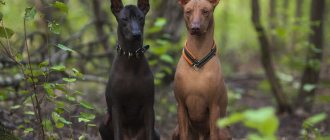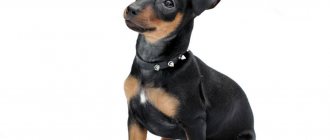Origin story
The true origin of golden retrievers has long remained a mystery. According to one legend, they performed in a traveling circus, where Lord Tweedmouth I saw them in 1856. After talking with the trainer, he found out that the artistic dogs with a golden color come from Russian Caucasian breeds. The lord bought them for a decent sum and transported them to an estate in Scotland. Tweedmouth quickly saw the hunting talents of the new pets and purposefully began selection. The breed is called the Golden Retriever.
This version was accepted by the Kennel Club of the United Kingdom and received official confirmation in 1913. However, already in 1927 it was called into question. Thanks to the efforts of researchers Elma Stokens and R. P. Eliot, the mystery of the origin of Golden Retrievers was finally revealed. The results of the "investigation" became available to the public in 1959.
It turned out that the first puppy with a golden color was bought by Lord Tweedmouth I from Lord Chichester, a Scottish breeder, in 1864. The baby received the nickname Noyce. Four years later he was crossed with a tweed water spaniel. The litter consisted of four golden puppies, which were later bred with Irish Setters. During further selection, the Golden Retriever was crossed with the Black Retriever, Setter, Spaniel, Bloodhound and Labrador.
The breeders managed to breed an intelligent gun dog that can retrieve game from both land and water. The task of the retriever is to accompany the owner during the hunt and wait for the conventional sign.
The first golden puppy was brought to Russia in 1989.
Appearance
Before getting a golden retriever, you should definitely study the description of the breed. These dogs are quite large - males reach 60 centimeters at the withers. Bitches are slightly smaller - up to 56 centimeters. And in terms of weight, they are very impressive - up to 36 and 32 kilograms, respectively.
Retrievers are built simply superbly - a beautiful, gracefully sculpted muzzle, a strong skeleton, muscular limbs and rounded paws. The transition from the muzzle to the forehead is clearly pronounced. The neck is strong and long. A wide chest gives considerable endurance. Her dark brown eyes are set wide apart, marking her as a descendant of hunting dogs.
At the same time, retrievers have a dense undercoat that does not allow water to pass through easily - a heritage from the Newfoundland. There are representatives of the breed with both straight and wavy hair. But the color range is not too rich. The standard allows cream or golden color. In some cases, there may be a small number of white spots on the chest. If the dog has white fur, this is a breeding marriage.
Description of the breed
The Golden Retriever is a strong, well-built dog with a sunny coat. She is known for her sharp mind and endurance.
Breed standard:
- Height up to 61 cm, weight up to 41 kg.
- The head is of good proportions and correct shape. The forehead is wide, but not massive. The muzzle is long and neat. The nose is medium in size, the nostrils are large and open. The desired color is black. The lips are dense, pressed closely to the teeth, and have small jowls. The jaws are strong and well developed. The bite is claw-shaped.
- The eyes are set wide. Shape – oval or almond-shaped. The iris is colored in shades of brown and nut.
- The ears are small, hanging, medium-set (at eye level), covered with short hair.
- The neck is muscular, moderately long, without dewlap. Softly blends into the shoulders.
- The body is elongated, slightly elongated, correctly balanced. The back is strong and straight, of moderate width. The stomach is slender and toned.
- The tail is long, straight, with abundant feathering. Never bent.
- Limbs are straight, powerful, muscular. The paws are round and medium in size. The fingers are pressed tightly together.
Goldens have a recognizable appearance and are one of the most popular breeds in the world.
Color
Goldens are famous for their thick coat. It can be wavy or straight. The pile has water-repellent properties. The undercoat is abundant and dense. The fur forms fringes on the ears and limbs. The hair on the body, ears and chest is especially long. Color – all shades of cream and golden. White is acceptable as a “patina” in the chest area. Red tones are undesirable.
Character
There are very few negative reviews about the personality of Golden Retrievers. This dog breed has earned the love of millions thanks to its friendly, calm disposition. It's hard to imagine a pet more oriented towards communicating with people. Goldens love to participate in family activities and do not like to sit idle. Their tendency to be helpful makes them excellent service dogs: retrievers work as guide dogs, rescuers, and participate in psychological assistance programs.
Goldens are true empaths. They subtly sense the mood of their owners and will do everything to prevent them from being sad. Retrievers are often used in zootherapy. They help sick children, pensioners and participate in various rehabilitation programs. Just being near a retriever charges a person with positive emotions and puts him in a positive mood. Children love these dogs very much and thrive when interacting with them. Retrievers are the best babysitters for babies. They will never offend a child and will tolerate even careless treatment.
The task of parents is to explain to their children the rules of behavior with animals and to prevent cruelty. If a dog does not show retaliatory aggression, this does not mean that this will always be the case.
Goldens are not prone to zoo aggression and find a common language with any animal. They will not provoke a fight and use every opportunity to avoid conflict. In the event of an attack, they will not flee, but will give the offender a worthy rebuff. In addition, the breed is known for its unobtrusiveness. They know when the owner wants to be alone and respect his wishes. Retrievers need to feel needed, so if a person is not ready to pay a lot of attention to the pet, he should reconsider his choice of breed.
A gentle, gentle character can turn into cowardice. Therefore, when choosing a dog, you need to take a closer look at the behavior of the puppy and the parents. Goldens also have a hard time concentrating. They are easily distracted during exercise and are overly trusting: dogs can follow a stranger who offers a treat.
Protect from loneliness!
When getting a retriever, be sure to think about whether you can provide him with a happy life? They really don’t like loneliness - spending the whole day in an empty apartment, the dogs are frankly bored. They need companionship as much as regular care to remain happy.
Under no circumstances should they be chained. Lack of mobility leads to the fact that dogs begin to eat poorly, lose weight, and become susceptible to numerous diseases. This may well lead to death.
Retrievers are an excellent choice for those who love an active lifestyle. Pets will be able to accompany their owners during walks and evening runs, and will consider it an honor to go hiking, hunting or multi-day fishing. And after spending their whole life at home, and even in an empty apartment, they will not really be happy. Remember this before you get a dog and condemn it to a miserable existence.
Care and maintenance
Retrievers quickly adapt to their environment, so they can be kept both in the house and in the apartment. Some owners keep animals in enclosures. This breed is known for being active and energetic. Dogs need regular, long walks. They love agility training and outdoor games.
Goldens are prone to excess weight, so do not neglect training.
Retrievers shed a lot, especially during the spring months. You need to spend at least 15 minutes a day brushing your animal. After a walk, goldens are combed especially carefully. Bath dogs as needed using special shampoos. Retrievers love water, so washing them is a pleasure. Ears are examined after each walk. They often get filled with blades of grass and dirt. The closure of the auricle provokes the occurrence of infectious otitis media. During the period when mites are active, the ears are especially vulnerable: the parasites hide in thick pile or crawl into the auricle.
Goldens are prone to inflammation of the choroid of the eyeballs, so hygiene should not be neglected. The eyes are cleaned of secretions using a cotton pad soaked in warm water, chamomile decoction or a special product. Nails are trimmed as needed. Teeth are brushed weekly.
Feeding
Proper nutrition is very important for health and longevity. Retrievers can be fed both high-quality premium food and dishes made from natural products. Drying has a balanced composition and does not require taking additional vitamins. In the case of natural animals, feed additives will have to be introduced.
Homemade meals are prepared using the following products:
- lean meat (beef, turkey, lamb, chicken, rabbit);
- well-cooked beef offal (liver, lungs, kidneys, tripe);
- sea fish (1-2 times a week);
- buckwheat, rice, rolled oats;
- fermented baked milk, cottage cheese, kefir;
- egg (one per week);
- cabbage, carrots, zucchini, turnips, pumpkin, beets;
- greenery;
- vegetable oil (1 tsp per day);
- carrot, apple.
The daily intake of raw meat is 300 g. It should make up half of the daily diet. It is better to choose meat with veins and cartilage. Remove the skin from the chicken before serving. A quarter of the serving should be cereals and another quarter should be vegetables. Vegetables can be given raw (mashed) or stewed. Add 1 tsp to them. vegetable oil (preferably olive oil).
If your dog is prone to obesity, porridge should be excluded from the menu.
List of prohibited products:
- pork and other fatty meats;
- poultry tubular bones;
- milk;
- potato;
- legumes;
- wheat and corn (may cause allergies);
- bakery products made from yeast flour;
- sweet;
- salty;
- fat;
- smoked;
- roast.
Dry food must be at least premium class. The ideal option is super premium or holistic. In the production of cheap products, waste from slaughterhouses and allergenic fillers are used. Economy class food can cause severe poisoning and urolithiasis.
A quality product should not be:
- fat (more than 10-14%);
- too protein (more than 28%);
- grains
It’s good if the food is made from duck, lamb, or turkey meat. It is better to choose grain-free products or those based on oatmeal and rice.
Quality feeds include:
- Now;
- GO!;
- 1st Choice;
- Biomill;
- Arden Grange;
- Grandorf;
- Acana;
- Belcando.
The dog must have constant access to fresh water.
What to feed?
How many times a day and what should you feed your Golden Retriever? Feeding is possible with both ready-made industrial feed and natural food.
You should not skimp on food, since the quality of life and health of your pet depends on nutrition.
When feeding natural food, in addition to meat, the diet should include fish, cereals, vegetables, herbs, and dairy products. This way your pet will receive all the necessary vitamins and minerals. The dog should always have clean water available.
Puppies are fed often and in small portions - from six times a day. By the age of eight months, they are gradually transferred to two feedings a day.
Training and education
Despite his intelligence and good-natured nature, the retriever needs training. He must know at least 4 commands: sit, lie down, next to me, towards me. Training begins at three months of age. Training is carried out in a playful way without the use of force. This breed is easily distracted, so the owner will have to be patient. He must create a program of varied training so that the animal does not get bored.
If you let your golden go outside to run around, he will most likely just lie down on the ground. Retrievers love group games. The best option is to buy a companion for the dog. You can have two females and even males. When training teams, praise and encouragement are effective. The main thing is not to overfeed. The workout should not last more than 10 minutes. Retrievers quickly lose patience and have difficulty concentrating.
Goldens love agility, Frisbee, and fetch. They will be happy to attend group classes where they can communicate with their relatives. In addition, professional training will help you avoid annoying mistakes that can delay the training process.
Owner reviews
Despite all the advantages of such animals, the opinions of dog breeders about them are ambiguous. Retriever owners note that this is an allergenic breed. They confirm the need to carefully care for your pet’s coat, bathe the dog often, and clean the house so that family members do not have problems with it. At the same time, many owners of retrievers claim that such animals have a gentle disposition, get along well with children, and easily master various commands. With proper upbringing, there are no problems with them.
Dog breeders also recommend that everyone who wants to have a boy or girl of a similar breed first think about where the animal will live, whether it will participate in mating, where it will be kept during vacation, and find out how much it costs to maintain a pet. If all these issues are resolved in advance, life with a retriever will be easy and carefree.
Diseases and life expectancy
Unfortunately, golden retrievers are not a healthy breed. They have a number of genetic abnormalities and are predisposed to cancer. They also often suffer from hip dysplasia and obesity.
The most common diseases include:
- hemangiosarcoma;
- lymphosarcoma;
- osteosarcoma;
- mastocytoma;
- hip dysplasia;
- epilepsy;
- raw eczema;
- diabetes;
- hypothyroidism;
- atopy;
- allergy;
- melanoma;
- laryngeal paralysis;
- cataract;
- glaucoma.
This breed is not suitable for owners who cannot pay for medical care.
On average, Golden Retrievers live 10-12 years.
Health Features
Almost all representatives of the breed are characterized by good health and immunity. This allows them to live up to 12 years, but proper care, nutrition and good health will allow four-legged pets to live up to 16 years. In the history of this breed, such cases of longevity have been recorded.
The development of dangerous diseases can be prevented through timely vaccination with foreign drugs. Also, the owner of the animal must remember about regular deworming and treating the skin with anti-parasite agents.
How to choose a puppy
Before purchasing a puppy, you need to decide on the purpose of the purchase. If a person wants to get a faithful friend and companion, but does not intend to participate in exhibitions, kids from the pet class category are suitable for him. They are picked up at the age of 2 months. If the buyer is committed to a show career, he should think about breeding and show-class puppies.” In this case, the puppy’s age should be 6-7 months in order to evaluate the quality of the exterior. It is not recommended to buy a baby by hand. Such dogs are susceptible to genetic abnormalities and have behavioral problems.
When examining puppies, you should pay attention to the following:
- arrangement of living space;
- health status and behavior of parents;
- appearance;
- absence/presence of discharge from the nose and eyes, damage to the coat and skin, condition of the teeth;
- dog's gait;
- how puppies interact with each other;
- how they treat people;
- availability of necessary documents and medical history of parents.
The best option is to take a specialist or an experienced owner with you.
Where to buy and price
The Golden Retriever is a popular dog breed, so finding an officially registered kennel is not difficult.
The most famous include:
- Goldendaisy (St. Petersburg);
- Elmedano (St. Petersburg);
- Ambergold (St. Petersburg);
- Russian Retriever Club (Moscow);
- Cantrigold (Moscow);
- Amansi Golden (Moscow);
- Noris Allur (Irkutsk);
- Farvissh Gold (Chelyabinsk);
- Lusso Angelo (Volgograd);
- From Boykogo Dom (Ekaterinburg).
On average, a Golden Retriever costs 25,000-60,000 rubles.
Golden Retriever and Labrador: Differences
The Labrador and the Golden Retriever belong to the same canine group of retrievers. These breeds are very similar, so the difference between them is not always obvious. Labradors originate from the island of Newfoundland and were trained not only to retrieve shot birds, but also to retrieve fish from nets. Goldens are exclusively gun dogs. Both breeds are used as service dogs. The Labrador has a sharper sense of smell even than German Shepherds.
Labradors and Goldens have similar external characteristics. These are large, broad-browed dogs with floppy ears. They differ only in color and coat type. Labradors are a short-haired breed. Their pile fits tightly to the body and can be painted in three colors: black, brown, fawn. Retrievers have thick, wavy coats with abundant undercoat. Color – golden and cream.
Both breeds are known for their friendly, easy-going personalities. Labradors are perpetual motion machines and are ready to play all day long. Retrievers are more reserved. They are characterized by aristocratic manners and selectivity. Labradors, on the other hand, are incredibly trusting and are ready to leave with the first person they meet. They adore people and animals. Both breeds are great with children. Labradors need a controller: they often drop the child while playing. Goldens prefer teenagers.
Buying a dog
When choosing a puppy, the first thing you need to decide is for what purpose it is needed: for hunting, shows, trials, or just for comfort and warmth in the family.
What should you pay attention to when buying a retriever?
- The puppy should be friendly, agile, not overactive or lethargic;
- The coat should be free of signs of parasites;
- The room in which puppies are kept must be warm, clean and free of foreign odors;
- When meeting, dogs should wag their tails.
If a puppy is purchased as a pet, the optimal age for purchasing it is 7-7.5 weeks . It is not recommended to move a puppy into a new environment at 8 weeks, as during this period he is especially sensitive to change. It's better to wait until 9 weeks.
Important! A Golden Retriever without a pedigree often turns out to be either a mixed breed or a very sick dog.
When buying a show puppy you need to be more careful. First, you need to study all the breed standards, which will become a guide in choosing a particular puppy. It would be a good idea to visit specialized exhibitions and talk with breeders who are exhibiting.
Some believe that the breeder will certainly keep the best puppies for himself. It's a delusion. Even the most active caregivers will be happy to give the puppy into the hands of people interested in showing and winning. It is imperative to request a pedigree, photographs, and a detailed description of the dog.
Buying an adult dog
Changing the owner and habitual habitat for a golden retriever is a lot of stress. Therefore, it is important that the previous owner himself brings the pet to the new home and helps him adapt a little. To speed up this process, it is recommended to place some object familiar to him in the place where the pet will sleep.
There is an undoubted advantage in buying an adult dog - complete confidence in its beauty and qualities. This is especially true when purchasing show dogs.
Preparing your home for a puppy
Before purchasing a puppy you must:
- Hide potentially dangerous items (tools, cords, small toys, chemicals, cleaning products);
- Remove plants that are dangerous to the puppy’s health (dieffenbachia, aucuba, spurge, cucumber, ficus, pasalia, holly, wisteria, cyclamen);
- Consult your veterinarian about the best food for your puppy;
- Ensures the availability of fresh water at any time;
- Prepare a sleeping place:
- Place a toilet (tray with filler) in the house.
Price of puppies
Factors influencing the price:
- Age (the older the puppy, the higher the price);
- Health status;
- Pedigree.
It is worth noting that domestic puppies will cost less than promising show puppies from the same litter. The price, depending on the above factors, ranges from 250 to 5000 dollars .
Pros and cons of the breed
| + | – |
| Faithful and devoted friends | They shed profusely |
| Beautiful hunting dogs | Not suitable for the role of watchman |
| Suitable for apartment living | Are happy to make contact with a stranger |
| Compatible with cats and other animals | Prone to cancer |
| Great with children | Have a short lifespan |
| Suitable for active owners | Requires patient training |
Golden Retrievers are ideal family dogs. They cannot live without communicating with people, they are very vulnerable. This breed requires affection, love and patience. They are distinguished by their delicacy: they will never impose their company. They enjoy playing with their relatives and other animals and adore children. Suitable for active owners who can devote enough time to the dog and pay for medical care.
Characteristics of the Golden Retriever
| Attachment level | High |
| Friendliness | High |
| Child Friendly | High |
| Loyalty to other pets | High |
| Exercise needs | High |
| Playfulness | High |
| Energy level | High |
| Learning ability | High |
| Intelligence | High |
| Tendency to bark | Average |
| Shedding amount | High |
Character
Golden retrievers amaze not so much with their intellectual abilities, but with their phenomenal memory for faces. They are friendly, playful, and always in a good mood. Such dogs, even in delicate situations, remain calm and calm; they try not to be the first to enter into conflict. Retrievers become so attached to their owners that communication with other dogs can come to naught. They will help a person get out of depression, and with the younger generation they show special trepidation.
Retrievers are not wary or suspicious, so strangers will arouse curiosity in these animals.
Nicknames
For golden retrievers, the nicknames presented in the table are suitable.
| For boys | For girls |
| Archie | Jesse |
| White | Bucky |
| Barney | Molly |
| Spikes | Gretta |
| Scythian | Paris |
| Dante | Irma |
| Bucks | Kira |
| Tucker | Bella |
| Parker | Shelley |
| Duke | Ilsa |











